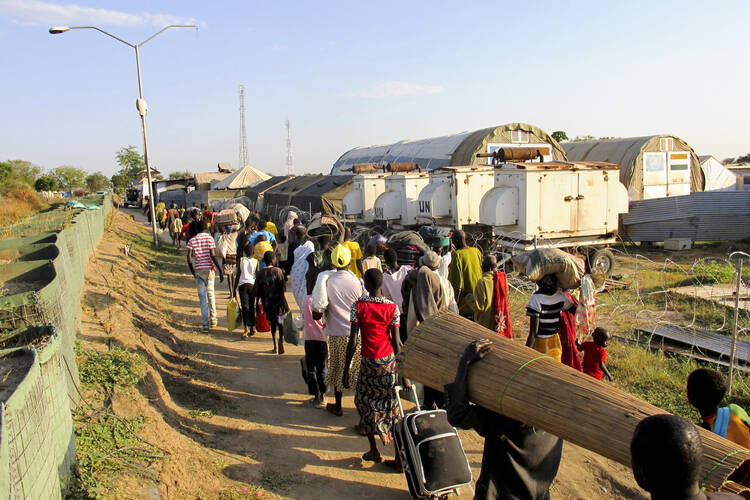The United Nations moved on the diplomatic and military fronts on Dec. 30 to douse the flames of conflict in South Sudan, with Secretary-General Ban Ki-moon urging the government to free political prisoners to facilitate talks with rebels and the Security Council holding a crisis meeting on latest efforts to reinforce UN peacekeepers in the world’s newest country.
“[It] is very, very dire situation,” Council President, Gérard Araud of France, told reporters after the meeting, in which Mr. Ban’s Special Representative, Hilde Johnson, briefed the 15-member body by video link from Juba, South Sudan’s capital, on the latest developments in the fighting, the mediation efforts of neighbours to stop, and the steps by humanitarian agencies to bring aid to those in need.
The fighting in South Sudan, which only gained independence in 2011 after seceding from Sudan, erupted on Dec. 15 when President Salva Kiir said soldiers loyal to former deputy president Riek Machar, dismissed in July, launched an attempted coup. Mr. Kiir belongs to the Dinka ethnic group and Mr. Machar to the Lou Nuer, and the conflict has been increasingly marked by reports of ethnically targeted violence.
Thousands of people are estimated to have died in the violence and some 180,000 others have been driven from their homes, up to 75,000 of them seeking refuge on the bases of the UN peacekeeping Mission in South Sudan (UNMISS), which has been authorized by the Council to almost double its armed strength to nearly 14,000 in an effort to protect civilians.
“It’s a situation that is really tragic,” Mr. Araud said. “It’s impossible to assess the number of casualties, but it’s really pretty high.”
UN Under-Secretary-General for Peacekeeping Operations Hervé Ladsous said it is hoped that all peacekeeping reinforcements will be on the ground within one to three weeks. The first two police units have already arrived.
Mr. Ban spoke by phone with Mr. Kiir on Dec. 30, welcoming his declared commitment to cease hostilities and readiness to engage opposition leaders in dialogue and encouraging him to consider the early release of political prisoners.
He reiterated full UN support for mediation efforts by the East African regional bloc known as the Intergovernmental Authority on Development (IGAD) and called for full cooperation by all parties in finding a peaceful solution. He also stressed the need to hold accountable those responsible for attacks on civilians.
Mr. Ladsous, who also briefed the Council, told reporters much progress had been made on finding reinforcements for UNMISS, including both troops and equipment such as helicopters. “We have been working round the clock to secure the contributions, the contingents and the equipment,” he said.
A lot of the reinforcements are being seconded from other UN peacekeeping missions in Darfur, Liberia, Haiti and Côte d’Ivoire, but these missions cannot supply all the necessary equipment such as a level-two field hospital and tactical helicopters.
“UNMISS suffers from a lack of rotary wing air assets. This is why it is a high priority that we can bring in more both utility and tactical helicopters,” Mr. Ladsous said, noting the mission’s surveillance and monitoring role over the vast territory, where it has detected armed groups moving north-east of Bor.
Mr. Araud, the Permanent Representative of France which holds this month’s rotating Council presidency, said Mr. Ban wrote to the Council asking for attack helicopters. In authorizing the increase in UNMISS last week, the Council stressed its priority role in protecting civilians.
There is still a lot of fighting going on around Bor, capital of Jonglei state, where 20,000 civilians have sought shelter on UN bases, and within the city of Malakal, where 22,000 others have fled to UN bases there, Mr. Araud said. In Bentiu, in the country’s oil-producing north, where oil production has ceased, Government forces are positioned to take the city.
The human rights situation is “also pretty worrying. There are reports of torturing, killing, disappearance and of ethnically targeted violence,” Mr. Araud noted, adding that the UNMISS human rights component has been upgraded so that there will be accountability for rights violations.
During his first Christmas message as leader of the Roman Catholic Church, Pope Francis called for an end to violent conflicts in South Sudan and in other toruble spots around the worlde. The Pope called for social harmony in the young state, saying current tensions have already cost numerous lives.
Speaking from the balcony at St Peter's Square and watched by a crowd of around 70,000 people, Pope Francis also lamented that violence has claimed thousands of lives in Syria, the Central African Republic, Nigeria and Iraq.
"Wars shatter and hurt so many lives," he said, saying their most vulnerable victims were children, elderly, battered women and the sick.
"Look on the many children who are kidnapped, wounded and killed in armed conflict, and all those who are robbed of their childhood and forced to become soldiers," he said.
He asked for people to be spared further suffering, and urged all parties in the conflict to allow humanitarian aid to get through.
"Prince of peace, in every place turn hearts aside from violence and inspire them to lay down arms and undertake the path of dialogue," he said.








